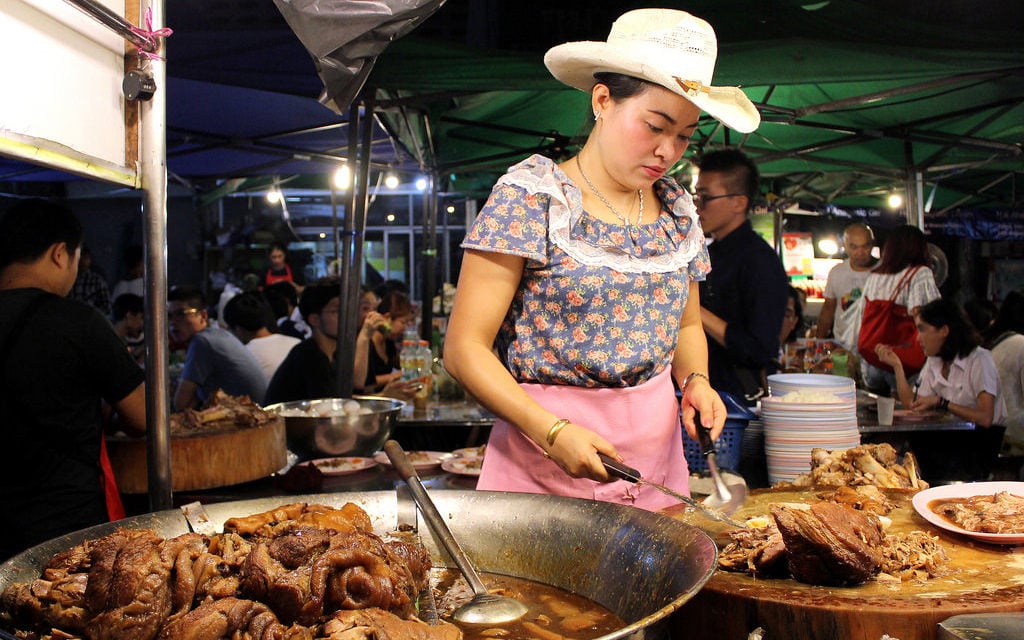When we think of cowboy hats and pulled pork, we probably think of barbecues in Alabama not street markets in Thailand. But walking beside the northern gate of Chiang Mai, Thailand’s biggest northern city, you will find a woman wearing a cowboy hat, meat cleaver in hand.
This woman, perhaps the most famous face in Chiang Mai, is known to the locals simply as ‘Cowboy Woman’. Her respect, love and passion for the food she creates makes her the perfect symbol for this haven of street food delights.
Often our unaccustomed eyes look at street food with more trepidation than intrigue, more anxiety than excitement.
With the safety nets of the modern restaurant all but gone, it truly is just you and the food. Inevitably, doubts pop into your head: “That’s an interesting colour for a sausage to be”, or “Can it really be that cheap?” or the age-old, “That’s a hell of a lot of flies”.
It would be a mistake, however, to avoid all street food stalls because of their lack of sink, table cloth or TripAdvisor rating. In reality, true, authentic street food will put a bigger smile on your face than even the most esteemed restaurants – all without breaking the bank.
In Chiang Mai, street food rules supreme. Food is not just functional there – as it can be in the West – instead, it is a lifestyle that impacts every waking moment.
Given its elevated status, the street food in Chiang Mai is complex, joyful and, ultimately, very, very delicious. Take Suki Haeng, a beautifully balanced pork stir-fry filled with bright yellow and green cabbage mixed with glass noodles.
Take Khao Soi, the noodle soup for which the city is famed: fragrant, colourful, light yet rich. The name literally means “cut rice”, referring to the traditional method of manually cutting the rice with scissors. Following the tradition started by the Southern Chinese Yunnanese Muslims, the dough for the rice noodles is stretched out on a cloth over boiling water. After this sheet is steamed, the noodle is rolled out and cut with scissors. No fancy machines to be seen on these streets.
Take Khao Kha Moo, tender stewed pork legs handed out by the Cowboy Woman. She chops the pork and serves it over a bed of rice all for 30THB (70p). Her food has gained so much recognition by tourists and locals alike that she was visited by the celebrity chef Anthony Bourdain when he travelled to Chiang Mai in 2014.
Bourdain was a man who broke down stigma, biases and cultural boundaries so he could focus on the amorous relationship between maker, eater and the food. Always honest and frank, he gained his fame by revealing previously unearthed culinary secrets: how much butter goes into all our food, the days we should avoid fish, what happens when you order meat well done – the list goes on.
Abandoning the professional kitchen, Bourdain showed the world that food is more than an allotted number of calories. Instead, he believed that food is tied up with emotion, memory and relationships. Cowboy Woman represents this ethos, telling Bourdain: “I’m happy when people eat, and they say the food was good”.
This simple joy expressed by street vendors across Thailand is the reason for such culinary success. Indeed, the way Thais love their food manifests itself differently to that of many Western chefs.
Thai food is not about meticulous accuracy. For the most part, innovation and futuristic artistry go out the window. These dishes are passed down through generations. They are dishes that, in many ways, transcend those who make them. Thais revere their food and expect their guests to do so too. Perhaps such a respect for the food we make, eat, and enjoy is an attitude we could all adopt.



